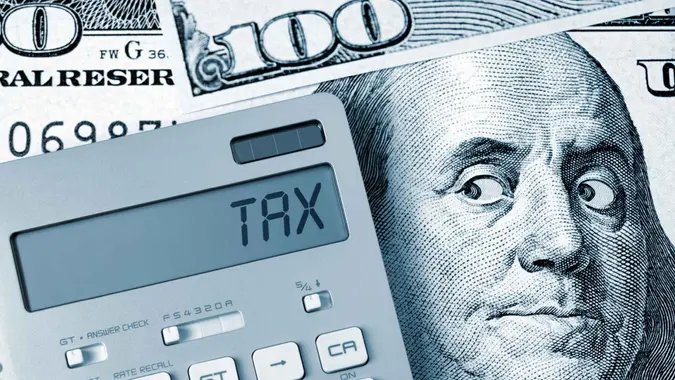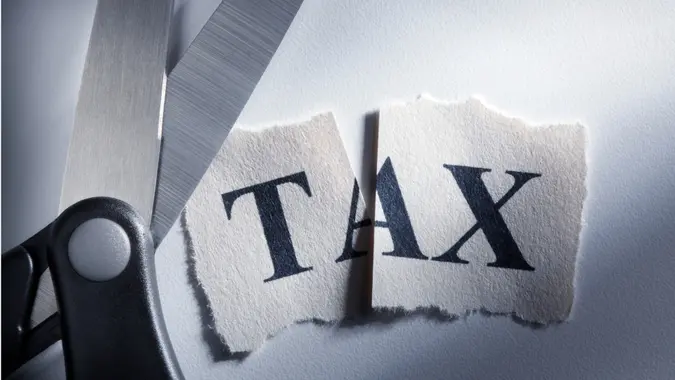Suze Orman Reveals What You Should Do Before Getting Your Tax Refund

Commitment to Our Readers
GOBankingRates' editorial team is committed to bringing you unbiased reviews and information. We use data-driven methodologies to evaluate financial products and services - our reviews and ratings are not influenced by advertisers. You can read more about our editorial guidelines and our products and services review methodology.

20 Years
Helping You Live Richer

Reviewed
by Experts

Trusted by
Millions of Readers
Suze Orman is one of the most popular financial personalities, with numerous books, videos, blogs and TV appearances to her credit. In a Jan. 11, 2024, post on her website, Orman discussed a topic that’s on the minds of all Americans at this time of year: tax refunds.
But rather than describing the filing process and how to boost your refund, Orman focused on how important it is to prepare to receive your refund so that you don’t get into financial trouble. What does she mean by that? Here’s an overview of Orman’s advice for her readers, along with a deeper look at the ramifications of her suggestions.
What Does Orman Mean by ‘Preparing’ for a Tax Refund?
When Orman says that you should prepare to receive your tax refund, she doesn’t mean that you should get excited about all the money you get to blow. In fact, her message is quite the opposite. What Orman wants is for her readers to make a commitment as to how they are going to use that refund.
If you write down your goal and commit to it, Orman suggests, you’re much more likely to follow through on it. Of course, using your refund to go on an expensive vacation or buy a new iPhone is not the type of commitment that Orman is talking about. Rather, she means that you should focus on which financial goal you want to take on with your refund.
Orman Says To ‘Be Specific’
When it comes to planning what to do with your tax refund, Orman says you don’t just need to write it down and commit to it — you need to be specific. For example, you may want to write down that you will use your refund to fund an IRA contribution, or otherwise put it into your investments. Paying down credit card debt is another good option. Or, you may just need the extra cushion in your budget to pay for essential or even past-due bills. Another good option would be to pad your emergency fund.
Any choice that will improve your financial life is a good one — Orman just stresses that you need to be specific about what that choice is.
How the Math Works Out If You Invest Your Refund Instead of Spending It
If you do get a tax refund and are looking to solidify your finances, Orman is right — paying down debt, catching up on bills and beefing up your emergency fund are all good first steps. But if you’re already covered in those areas, investing your refund can make a huge difference when it comes to your retirement security. Here’s a simple example, using the average 2022 tax refund of $2,753.
Imagine that you invest that average tax refund every year for 30 years and earn an 8% annual return. That cumulative investment of $82,590 would grow into a sum of over $311,000. If you could invest your refunds for 40 years instead, say from ages 25 to 65, you’d end up with over $700,000.
While it can be hard to deny short-term desires in favor of long-term security, the math makes a compelling argument. While there are certainly a lot of fun things you could buy with 40 years of refunds, turning that $110,000 into over $700,000 in retirement savings instead would be a life-changing choice. Plus, you wouldn’t even be going out of pocket to generate that nest egg. As soon as you get your refund, you could simply move that money into your investment accounts without changing your monthly budget at all.
Why You Might Not Want To Get a Refund in the First Place
Getting a check from the federal government isn’t something that happens every day, so it’s understandable that people get excited when they get their tax refunds every spring. But it’s important to understand that a tax refund — as the name actually implies — is simply a return of your overpaid taxes. In other words, the IRS is simply paying back your own money that you have overcontributed throughout the year. During that time, the IRS has been able to use your money free of charge.
From a financial planning standpoint, it makes much more sense for you to be in control of your own money throughout the year rather than offering an interest-free loan to the government. By paying less in taxes during the year, you’ll be able to use that money every month to pay bills, build an emergency fund or invest, rather than waiting to do all that when you get a tax refund in the spring.
More From GOBankingRates
 Written by
Written by  Edited by
Edited by 


























